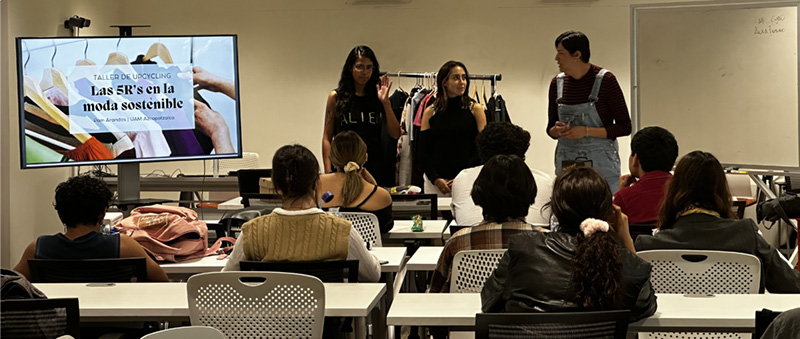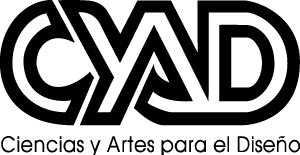SUSTAINABLE
Welcome to the new era of design committed to the FUTURE!
The Bachelor's Degree in Sustainable Project Design will begin activities next trimester (November 2023 - February 2024). With this, we warmly and enthusiastically welcome the first generation of students.
It’s a new degree that was approved last May 2023 in session 503 of the Academic College and is attached to the Division of Sciences and Arts for Design (CyAD); it has a transdisciplinary character that makes it unique, in its curriculum, professors-researchers from the divisions of Social Sciences and Humanities and Basic Sciences and Engineering participate jointly and it will be taught in a blended modality at the Azcapotzalco Unit.


What is development and why do we need sustainable project designers?
Sustainable development is a topic of great social and academic relevance nowadays. There is a growing concern for environmental care in balance with the social and economic aspects of the context, which is why this approach is based on satisfying current needs without compromising those of the future. In this context, sustainable project designers play a crucial role because their work involves addressing contemporary challenges from a comprehensive and holistic perspective.
We aim to train professionals capable of designing and leading sustainable development projects as agents of change and creative innovation, with an ethical and humanistic approach, and with a sense of social justice. Professionals trained to design, coordinate, intervene, and evaluate sustainability projects to maintain environmental health, create economic well-being, and seek social justice in a changing world. It works in both urban and rural environments, at a global scale as well as within national and local contexts.
Check for the application period and be part of CyAD Azcapotzalco.
A career that stands out for:
The Bachelor's Degree in Sustainable Project Design is characterized by its blended teaching-learning modality, which combines in-person, distance, and virtual activities. Through this modality, students will have access to various teaching support materials, digital and audiovisual academic resources, hosted on the institutional platform responsible for coordinating them.
A second characteristic that distinguishes it is the oriented learning approach where students will develop projects to solve problems within the social and sustainability spheres. Throughout various stages, from gathering information to process evaluation, they develop the capacity to diagnose community problems from a systemic perspective, both locally and globally; design and manage sustainability projects at different levels of complexity; lead social transformation processes, and promote democratization through participatory community processes.
Multidisciplinary collaboration and intervention in research, to propose and comprehensively solve problems among academic units, divisions, and areas of knowledge. An inter and transdisciplinary approach aimed at developing professionals with the skills and competencies to propose and integrate solutions to complex societal problems.
What would the graduate of the new bachelor's degree be able to do upon finishing his degree? hacer el egresado de la nueva licenciatura al terminar su carrera?
The teaching-learning processes of the study plans and programs contemplate various training approaches and strategies that aim to provide the student with tools and experiences to solve problems. These training modalities distinguish the educational model of the CyAD Division, consisting of disciplinary, inter and multidisciplinary training.
Disciplinary training corresponds to the assimilation of knowledge, the development of skills and attitudes related to the specific knowledge area of the discipline in which the student develops.
Inter- and multidisciplinary training allows the student to reformulate the knowledge acquired through the integration of knowledge from each of the theoretical and practical disciplines. This allows them to develop their creativity and innovative capacity to seek to solve society's current technological problems.
The Bachelor's Degree in Sustainable Project Design offers comprehensive and up-to-date training to face the challenges of sustainable development.
If you are interested in a career that makes a difference and contributes to the well-being of future generations, this degree is the perfect option for you.
Join us and be part of the change towards a sustainable future!
If you have any questions or need more information, you can contact us via email at: codips@azc.uam.mx.

"That the student acquires the basic theoretical, methodological and technical knowledge of their profession and develops the necessary skills to integrate them into the solution of specific problems, through the systematic application of the design process."
- Introduce students to the general field of design, so that they understand its main characteristics, conditions and development possibilities and identify each of the disciplines offered in the Division.
- Provide students with a fundamental theoretical framework, general procedures, technological tools and basic design language.
- Form in students a general vision of sustainability and the variables that intervene in the problems associated with the topic.
- Proporcionar al alumnado, herramientas básicas para el manejo e interpretación de información.
- Integrate the students into the educational model of the UAM, the Azcapotzalco Unit and the Division of Sciences and Arts for Design.
FIRST QUARTER |
SECOND QUARTER |
|
Theoretical Foundations of Design I |
Theoretical Foundations of Design II |
|
Culture and Design I |
Principles of Sustainability |
|
Basic Language |
Design Systems |
|
Elements of Mathematics for Design |
Statistics for Sustainable Design |
|
Digital Representation and Expression Workshop |
Descriptive Three-Dimensional Digital Representation and Expression Workshop II |
The professional field.
The professional field for this degree is broad and diverse. Graduates can work in government entities, the private sector, as independent environmental consultants, in academic fields, and research centers. Some of the roles they may take on include sustainable project managers, administrators of ecotechnological solutions, sustainability consultants, project designers for social entrepreneurship, and designers of environmental policy instruments, among others.






